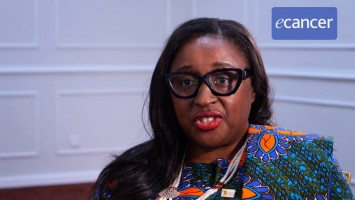I have been in the field for more than forty years. When I graduated as a medical doctor in 1974 announcing to a patient a diagnosis of cancer was a death sentence. I really feel extremely lucky to have the chance to see throughout my medical career, my professional life, so much change and improvement for the patient. Cancer is no longer a death sentence and we have great hope because we are curing a lot of patients and for the others we dramatically improve their quality of life.
It is something more of a lived with condition like diabetes.
Yes, we have to learn to live with cancer as a chronic disease. This is going to be more and more in the future with the discovery of more effective treatment.
On to the next question of how do we deal with good news and bad news?
It depends on the type of cancer; there are more than one hundred types of cancer. I think a diagnosis of leukaemia in a child is something totally different from lung or pancreatic cancer. Today we are curing more than 80% of children with cancer; we are curing 90% of patients with Hodgkin disease, 99% of testicular cancer and so on and so on. Still, for some cancers it remains a very life-threatening condition. So making the announcement has to be adapted to the situation and the patient but it’s still putting a lot of pressure, stress and anxiety to the patient but also to their family.
How would you rate the involvement of patient advocates and charities in terms of communication and education for patients when they receive that diagnosis that this isn’t the death sentence it used to be?
This is also a very good initiative that I’ve lived through during my medical career because those approaches did not exist in the ‘70s, involving patients in reviewing protocols, in explaining what it is to be part of clinical trials. Here I would like to really highlight the involvement of the patient like, for example, in EORTC where I have been Director General for 25 years. There are hundreds, thousands of patients who trusted us, who accepted to be part of an experimentation of clinical trials. If we are here today with curing so many patients it is thanks to their involvement as well and to the trust they put in us clinical investigators. So that is really important, the impact of the patient involvement, patient empowerment. And also cancer charities who have realised that the patient needs support and that education of the patient on methodology, for example, of clinical research is also important. This is also something that EORTC has been very keen to do for the last forty years is specific courses dedicated to patients on methodology, what does it mean to be in a clinical trial and so on.
Then on to the final question of addressing and overcoming challenges for cancer survivors.
On the one hand we are curing patients. We medical doctors, investigators, have done the job but now we are facing new challenges the society has to follow, has to understand. Some patients may get difficulty to get or to keep their job; they may have financial difficulty to get a mortgage, to buy a home, to buy an enterprise if you are an entrepreneur. Insurance is also a key issue. I am organising an EORTC cancer survivorship programme for a research programme and also a survivorship summit and we have huge testimony from many former patients who tell us I never get a mortgage, I never get life insurance or medical insurance for forty years. A Hodgkin patient cured and treated for forty years without a single medical insurance. So there is a huge challenge for the society to make the bank, the entrepreneur, the employer and the legal framework to be adapted to those new needs. Because it’s very nice to be cured but you are asking to live a normal life. It’s not only the physical and medical aspects of sterility, of fertility or secondary tumour or toxicity on your lung, on your heart, because you have been irradiated, for example, it is also societal issues of having access to jobs, insurance coverage and so on. This is really my contribution to the last part of my medical profession, if you want.
That covers all of the questions that you were sent. Was there anything else that you’d like to mention?
Yes, I think it’s a very difficult task that I am addressing myself to change society. In France they have a new law since 2016, "la loi droit à l'oubli", meaning that for a patient who has been cured of cancer ten years after the treatment the patient by law doesn’t have to say to the insurance that he had cancer or the insurance, even if the insurance know, cannot take into account the fact that the patient had cancer and for a child it’s five years. I think this law is really moving in the right direction. One of my dreams, and you have to have projects and dreams in life, would be that the legal framework changes at the pan-European level. It’s a huge task, I realise, but I am dedicated to try to work to make sure that the legal framework also follows the medical success.








